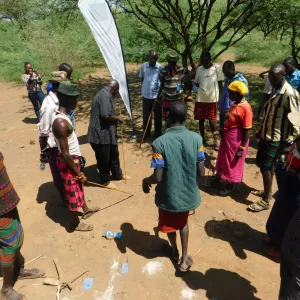Participatory rangeland management upscaling boosted by new IGAD agreement
On 6th October, the International Livestock Research Institute (ILRI) signed a contract agreement with the Intergovernmental Authority on Development (IGAD) to pave the way for further upscaling of participatory rangeland management (PRM) in Djibouti, Ethiopia, Eritrea, Kenya, Somalia, South Sudan, Sudan and Uganda. This core innovation of the CGIAR Research Initiative on Livestock and Climate aims to strengthen community capacities

Participatory rangeland management upscaling boosted by new IGAD agreement
On 6th October, the International Livestock Research Institute (ILRI) signed a contract agreement with the Intergovernmental Authority on Development (IGAD) to pave the way for further upscaling of participatory rangeland management (PRM) in Djibouti, Ethiopia, Eritrea, Kenya, Somalia, South Sudan, Sudan and Uganda. This core innovation of the CGIAR Research Initiative on Livestock and Climate aims to strengthen community capacities in planning, managing, and governing their rangelands more effectively.
The agreement supports the development of a field manual on PRM, which draws from the experience of PRM application in the region along with the wealth of knowledge found in the region’s rangeland experts on improved management tools and processes. To finalize the manual, the IGAD Center for Pastoral Areas and Livestock Development (ICPALD) held a regional validation workshop on 27 and 28 October 2023. The workshop brought together representatives from ministries of agriculture and livestock of IGAD member states, non-governmental organizations (NGOs), and the German development agency GIZ, which provided financial backing for the manual’s development.
The workshop also provided an opportunity for participants to enhance their understanding of the region’s specific needs for the PRM approach and to facilitate the exchange of insights on its execution. Participants reviewed the draft manual, contributing suggestions to improve its applicability and ensure it accurately reflects the varied rangeland management situations in the region. The finalized PRM manual is expected to play a crucial role in promoting the adoption of PRM practices throughout the region over the next five years.

PRM as a response to climate challenges and community needs
Amid increasingly severe and prolonged droughts, escalating rangeland degradation, land use conflicts, and deteriorating governance and management structures in the region, there is an urgent need to enhance the capacities of communities and relevant stakeholders to counter these challenges. PRM has emerged as an effective strategy to address these issues. Dereje Wakjira, Director of ICPALD, emphasized the significance of this approach:
‘IGAD aims to drive scaling up of PRM across the region because improved rangeland can contribute to a triple-win: climate change adaptation, mitigation and improved livelihoods.’
PRM’s pilot projects in Kenya and Tanzania, particularly in Baringo County, have so far yielded positive outcomes. These include improved rangeland management and governance, increased participation of women in decision-making processes, enhanced livestock productivity, and greater investment in rangeland restoration activities. This success is also highlighted by its integration into Baringo County’s Integrated Development Plan and its recent expansion into Wajir County, as part of the Accelerating Impacts of CGIAR Climate Research in Africa (AICCRA) project. This expansion has sparked growing interest from other counties in Kenya to adopt similar approaches.
ILRI and its partners are excited to be working with IGAD to scale up, refine, and tailor PRM to specific contexts. This collaboration focuses on understanding the impacts of PRM on the livelihoods and food security of livestock keepers and others, while also emphasizing its role in empowering women.
—
Initially launched under the CGIAR Research Program on Livestock and supported by an EU-funded bilateral project, PRM is now a key innovation of the CGIAR Research Initiative on Livestock and Climate.
Story by Fiona Flintan, Lead, CGIAR Research Initiative on Livestock and Climate

